
Stone Washington
Transcending authoritarianism: Machiavelli's the Prince vs. the Prince of China
By Stone Washington
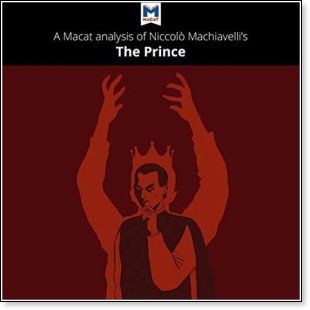
"Men are so simple and so much inclined to obey immediate needs that a deceiver will never lack victims for his deceptions."
~Niccolo Machiavelli, The Prince
"China does not export [Communist] Revolution."
~Xi Jinping, President of China
Historical Background
At the height of the 15th century, the kings of England, France, and Spain combined their scattered territories into self-contained political units called "nation-states." These nation-states were centralized governments that exerted control over the courts, military, and taxes. Trade was encouraged among nation-states, separated by boundaries, while limiting the power of nobles and dynasties, formerly holding power over local governments in medieval Europe (10th-14th centuries). This was the age of dictatorial, autocratic monarchs who arose during this time to dominate their neighbors, including: Louis XI of France (1423-83) and Henry VII of England (1457-1509), whose reigns constantly challenged the less unified territories of Western Europe.
Italy followed a different path from the nation-states surrounding it, instead of fragmenting into a number of "city-states," or independent sovereign states centered around a city, with control over surrounding areas. The dominant city-states of the time were the Republic of Florence, the Roman Catholic dominated Papal states, the Duchy of Milan, the Republic of Venice, and the Kingdom of Naples. Through a series of competitive treatises and alliances, each city-state attempted to gain as much territory as possible while going to war in attempts to prevent other city-states from doing the same thing.
Also, during the early 15thcentury existed several families fighting for control over the republic of Florence, which recently overcame a harsh period of the bubonic plague, banking collapse, and threat of invasion from the Duchy of Milan. The Medici family emerged with control over the city-state, returning Florence to stability, making fortunes in wool, banking, and international trade. The most important members of the Medici were Cosimo "the Elder" (1389-1464) and Lorenzo "the Magnificent" (1449-1492). Both men were also prominent patrons of the arts that funded many famous painters: Donatello, Botticelli, Galileo, Michelangelo, and Ghiberti Brunelleschi, among many others making Florence culturally famous. Despite ushering the "Golden Age" in Florence, Lorenzo taxed the citizens heavily to benefit his family and made uneasy alliances with Naples and Milan to safeguard against the Papal States, Venice and foreign invaders.
After Lorenzo passed away in 1492, he was succeeded by his son Piero (1471-1503), who severed his relation with Milan by supporting Naples, which later led to the Duke of Milan to seek military protection from Charles VIII, King of France, against Florence and Naples. A frightened Piero fled Florence after only a brief three year rule (1491-94). The Florentines then formed a republican government, led by the Monk Savonarola (1452-98), with Niccolo Machiavelli (1469-1527) serving as diplomat. But the citizens grew increasingly restless and when the French once again invaded Italy, the Florentines overthrew Savonarola, supporting the return of the Medici family, led by Pietro's young son Lorenzo II (1492-1519). In 1512, Lorenzo II expelled all associated with the republican form of government, including Machiavelli.
One year after be exiled, Machiavelli made an appeal to the new ruler, Lorenzo II, seeking to return to public service. Machiavelli claimed to have an answer for the political unrest plaguing Italy and offered his remedy in the form of his magnum opus, The Prince, meant as a gift to Lorenzo, whom Machiavelli believed could be the savior that unifies Italy's city-states under a solid nation-state. But Lorenzo refused to pardon Machiavelli and the Italians expressed no common desire for national unity against foreign powers as encouraged in The Prince.
Machiavelli's ideas, however, did not go to waste, and were utilized by future World leaders and brutal dictators including: Cardinal Richelieu of France, Frederick the Great of Prussia, Otto von Bismarck of Germany, Mussolini (notable for writing his PhD dissertation on The Prince), Stalin, Lenin, Hitler, and now today Xi Jinping of China. Machiavelli's work would provide the primary basis that fueled these and other murderous regimes and radical political ideologies like Marxism, Communism, and the Progressive liberalism (the modern Democrat Party) centuries after The Prince was formerly rejected as deifying anti-Christian, atheistic, and immoral statecraft.
In this article I will explain how the current Communist dictatorship in China under the now President for life Xi Jinping has implications of and closely resembles Machiavelli's brutal political framework as discussed in his work. I will reveal how China is now more than ever the deadliest threat to American peace and sovereignty, challenging our interests militarily, economically, and technically, with the ultimate endgame of usurping the United States's position as head of the unipolar World order. This indeed has for the past 30 years been the Globalist's dream: to replace the United States with China as the singular Superpower with the billionaire oligarchs like Soros, the Rothchilds, the Technocracy Tyrants, the UN, EU, World Bank, NATO and other internationalist entities allied with China as rulers of the world.
Monarchies (Chapter 1-11)
Machiavelli begins his work by making known the two basic forms of governance: monarchy and republic. A republic is a government where the supreme authority lies with the citizenry, represented by a political body such as Congress or Parliament. In contrast, a monarchy is a government in which absolute authority rests with one ruler, a king or prince (Machiavelli uses "prince" to mean a king, monarch, or any type of supreme male ruler, rather than the "son of a king"). Machiavelli states that inherited principality is the easiest monarchy since the prince does not have to act harshly or suppress anyone to gain land and power. In contrast, new monarchies present much difficulty in maintaining. This can include "mixed monarchies" where the ruler adds to land already owned, won in battle or annexation. A prince must beware of those whom live in this land can soon after, overthrow him if he offends them.
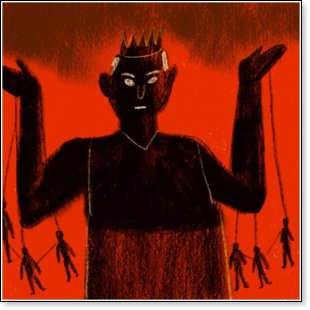
The Prince is the ultimate manipulator of humans and human nature, and this the Prince is the ultimate puppet master.
Territories that bear the same religion as the prince are much easier to control than those with differing religious practices. Ensuring that the old ruling family is departed, while not making any needless changes to laws and taxes, will cater to the will of the people. Machiavelli suggests it wise for a prince to live in the conquered territory, similar to the Turks annexing Greece in 1453, which allows him to act swiftly if a problem arises. It is mandatory to either live in a territory that was formerly a republic or destroy the city entirely. Otherwise citizens will long for their former freedoms and rebel against the perceived tyrant. An effective way to control a republic is to establish colonies, as was the case in Rome. Colonies are cheaper than maintaining a standing army, and the settlers act as a conduit between the territory and the prince. A wise prince protects his weak neighbors (so they remain friendly), while weakening his more powerful ones through aggressive acts (so not to threaten him).
Princes that gain territory through military might have an easier time controlling it than those who gain it through sheer luck or financial donation from wealthy private citizens. Quoted examples of this militaristic type of prince by Machiavelli include: Moses, Romulus, Cyrus, and Theseus. An example of a prince who gained territory on someone else's help is: Cesare Borgia (1476?-1507), ruler of Emilia- Romagna in northeast Italy, who inherited his enormous territory from his father, Pope Alexander VI (pope from 1492-1503). Much to Machiavelli's surprise, Borgia formed his own army, killed anyone who opposed him, bringing "peace" to Romagna through violent and cruel means, while establishing alliances with other nations. But Borgia's reign was cut short after his father died, and the new pope, Julius II, was hostile toward him. Machiavelli encourages a prince to be cruel (when necessary) and to seize power and control through ruthlessness and fear ("It is better to be feared than to be loved"). While the people will eventually forget about the cruelties, a prince should provide benefits to his subjects a little bit at a time, so as to always seem generous.
A wise prince surrounded by nobility will make the nobles depend on him and not feel equal. If ordinary people want the prince to rule, he should do so fairly, and minimize any problems by refraining from hurting anyone. People who formerly governed themselves under a republic are less likely to rebel if they feel that the prince is the only one who can protect them. Machiavelli then concludes by commenting on "ecclesiastical principalities" that are controlled by the Roman Catholic Church, which is easy to be controlled. Invaders are reluctant to war against God's land.
Military Power: Chapter 12-14
Machiavelli states that the most certain way for a state to remain powerful is to have a strong army. Warfare must be the most important focus of a prince. Emphasizes studying war during times of peace, emulating successfully warriors throughout history. Mercenaries must never be used by a prince, because they have no loyalty. Instead, the best army is one consisting of well-trained soldiers native to the country of the Prince.

Qualities of A Successful Prince: Chapters 15-23
Machiavelli admits that although it is admirable for a prince to be: generous, courageous, intelligent, trustworthy, and merciful, most humans do not possess all of these virtues. A prince should avoid scandal, but while also being unafraid to utilize immorality to help the state, even when threatened of being branded as traitorous. A prince must be wary not to become liberal and spend money excessively. Must have enough money for his first priority: the protection of the state. A prince should provide a strong and adequate military without reliance on raising the taxes of the people.
Machiavelli states that while it is ideal for a prince to be both feared and loved, it is better for him to be feared. People are ultimately untrustworthy, and more likely to respect someone that they fear rather than love. On the other hand, a prince must avoid being hated by the people, who will rise against him. A prince must appear to be generous, merciful and religiously acceptable. A wise ruler is aware that it unnecessary to keep promises if deception will profit the state. If a prince annexes new territory, he must disarm the citizens while ensuring his own soldiers have military control. A prince is sure to make friends out of his former enemies (the conquered people), whose loyalty will provide more safety than physical fortresses in defending the state. A prince must surround himself with capable advisers with good judgement, according to Machiavelli, and distance himself from flatterers.
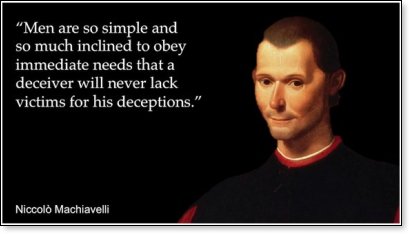
Problems of 16th Century Italy: Chapters 24–26
Machiavelli admits to having written The Prince for inexperienced rulers. In Italy, princes have lost their prominent positions not because of misfortune, but because they have acted unwisely. Some Italian princes failed to control the nobles, some were without their own standing armies, and some neglected to befriend the people. Machiavelli acknowledges that God and chance dictate much of mankind's fate. But he also believes that the role of fortune can be minimized and is something that a prince should not solely rely upon.
A prince must learn to be flexible with his people since people are fixed in their ways; otherwise he may be caught unaware by the political climate of the citizenry. Machiavelli states that it is better to rush into a situation than to be cautious. He concludes by arguing it time for a new prince to govern Italy – one capable of unifying the various Italian states into one prosperous nation. He appeals to the Medici family to heal and unify Italy. He desires for Lorenzo II, the new Medici prince, to develop a national army that will revive the forgotten honor of an Italian Empire, one worthy to follow in the path of the glorious Roman Empire.
Message for Modern Day – Machiavellian China
Despite its initial rebuke an unpopularity in the eyes of Lorenzo II, The Prince has been widely regarded as one of the greatest classic works of political statecraft ever created. Machiavelli's work has laid the primary foundation for nearly every authoritarian and dictatorial regime known to man, instructing rulers how to ascertain and maintain power for centuries. For the modern day, Machiavelli's strongest influence has been with Communist China, the only official authoritarian World super-power in existence. China first established its Communist identity on October 1, 1949 under Mao Zedong, notorious for being one of the most blood-thirsty murderous tyrants in History. Those who are unaware of current political and historical trends often make the misconception that China has renounced its Communist makeup and has honored its title as the "People's Republic." As the prominent historian and philosopher George Santayana famously said, "Those who do not remember the past are doomed to repeat it." Chinese Communism has not dissipated and has only modernized in efficiency under a hybrid capitalist economy headed by a supreme dictator, Xi Jinping.
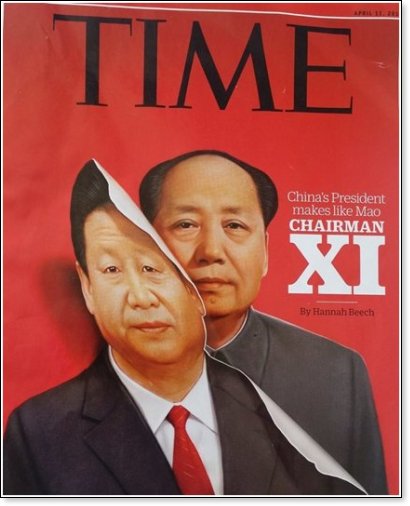
Upon analyzing the emergence of Chinese communism, one becomes aware by how Mao utilized many of Machiavelli's merciless tactics to establish dominance. With The Great Leap Forward, launched in 1957, forcing Chinese citizens to end all agricultural activities in pursuit of accelerating the process of industrialization, Mao oversaw the worst famine in Chinse history, equaling between 30-40 million deaths (roughly the current population of California). Paying homage to Machiavelli, Mao utilized Cesare Borgia's brutal military suppression tactics to persecute all who disobeyed the mandates of The Great Leap Forward, branding traitors as counter- revolutionaries, while ensuring that the Chinese Empire was protected from revolt. Public struggle sessions, social pressure, and even enslavement were consequences enforced by Mao's military regime on the starving peasants who betrayed the government. These methods are inspired by Machiavelli's philosophy of suppressing neighboring colonies deemed as enemies of a prince, weakening rebellious subjects to humiliate and quash any potential threats in the future.
Mao, like other famous dictators of the 20th century, employed Machiavelli's suggestion toward an annexed territory, restricting the use of firearms; collectively disarming the public while arming his own military. Mao implements Machiavelli's dictate for a prince to weaken the surrounding nobility in order to control them by launching the cultural revolution. Mao created the Red Guard, formed by Chinese students, who were advised to attack and harass members of China's elderly and intellectual population, whose intellectual authority rivaled the financial authority of the nobles in Machiavelli's age, thus endangering the empire.
In today's China, Mao's ruthlessness is upheld by reigning authoritarian, Xi Jinping, who has maintained many of Mao's brutal suppressions while hiding the nature of his ruthless regime behind a façade. As of Sunday March 11th 2018, China's parliament officially scrapped presidential term limits, allowing President Jinping to remain in power for the rest of his life. Out of the 2,963 delegates present at the annual session of the National People's Congress, 2,958 voted "yes" to the resolution, with only 2 voting "no" and 1 abstaining to vote. This order established Jinping's legitimacy as a Communist dictator, leaving nothing to oppose his lifetime reign, while essentially nullifying the dwindling powers of the weak parliamentary system in China. Jinping ascended to power through the office as general secretary of the Communist Party in 2012. While President, there exist heavy restrictions on civil society, the imprisonment of activists and lawyers, and even stricter limits on the already heavily regulated internet. Chinese Christians are also heavily persecuted for expressing their faith, with the number of persecutions expanding from 48,000 to 223,000 between 2016 and 2018 alone, according to human rights lawyer, Fu Hauling.
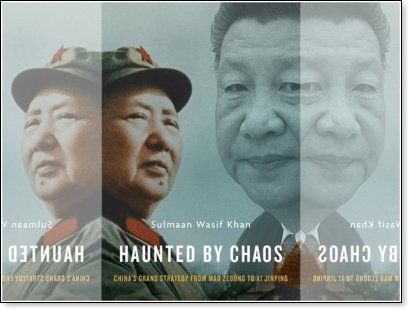
Jinping plays right into Machiavelli's treatise for ruthless princes, imprisoning any class of people deemed a threat to the all-powerful secularist totalitarian state, while appearing generous and religiously accepting to other countries. As taught in The Prince, Jinping is an expert at using deception as a profit to attain power, aware that the general public is either unmindful or submissive to their freedoms being increasingly squandered. Jinping's ascendency to life in office was attained in the shadows before news was officially released by the state-run media on February 25th, a week before the legislature's opening session was supposed to commence. Criticism of the dictatorial move was quickly silenced online, with the government removing and blocking any comments speaking against Jinping's corruption.
In conclusion, Machiavelli couldn't be prouder of how expertly Communist China has maintained corrupt and unfettered power over an oppressed people for nearly 70 years. The fact that the United Nations, NGOs, and various world leaders refuse to condemn and sanction China for its blatant civil rights abuses and illegal consolidation of power plays right into Machiavelli's desire for weakened neighboring states to remain fearfully beholden to a single unmatched authoritarian regime. But thankfully, there remains one nation that is unafraid of the rising Chinese hegemony and has turned the tables on the dictatorial regime in the form of massive tariffs on Chinese goods. The United States now stands to replenish its $33 billion trade deficit in a series of combative tariffs, until China ends its corruptible practices of currency manipulation, intellectual property theft, and utilization of abusive low-waged labor. Hopefully, America, the true Republic, will put a complete end to the Machiavellian manipulations of the false "People's Republic" of China and the increasingly corrupt Xi regime.
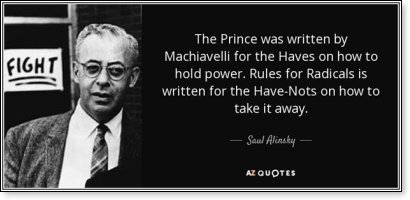
*N.B: This essay is based in part on a synopsis of Machiavelli's cunning work, The Prince, contained in, Dr. W. John Campbell, Book of Great Books: A Guide to 100 World Classics (Fall River, 2000), pp. 665-673.
*https://www.armstrong.edu/history-journal/history-journal-war-and-politics-in-the-thought- of-machiavelli;
https://www.wnd.com/2008/07/69957/
"Now it is true that Strauss criticizes Machiavelli for being amoral, pro-tyranny, interested only in social morality and the appearance of morality, etc...Strauss's bitter quarrel is largely theological, an attack on Machiavelli for being the first thinker to be non-Christian, to dismiss the Bible as fairy tales, etc.
*Roberta A. Modugno, Rothbard vs. The Philosophers (Ludwig von Mises Institute, 2009), p. 99.
© Stone Washington
August 29, 2018

"Men are so simple and so much inclined to obey immediate needs that a deceiver will never lack victims for his deceptions."
~Niccolo Machiavelli, The Prince
"China does not export [Communist] Revolution."
~Xi Jinping, President of China
Historical Background
At the height of the 15th century, the kings of England, France, and Spain combined their scattered territories into self-contained political units called "nation-states." These nation-states were centralized governments that exerted control over the courts, military, and taxes. Trade was encouraged among nation-states, separated by boundaries, while limiting the power of nobles and dynasties, formerly holding power over local governments in medieval Europe (10th-14th centuries). This was the age of dictatorial, autocratic monarchs who arose during this time to dominate their neighbors, including: Louis XI of France (1423-83) and Henry VII of England (1457-1509), whose reigns constantly challenged the less unified territories of Western Europe.
Italy followed a different path from the nation-states surrounding it, instead of fragmenting into a number of "city-states," or independent sovereign states centered around a city, with control over surrounding areas. The dominant city-states of the time were the Republic of Florence, the Roman Catholic dominated Papal states, the Duchy of Milan, the Republic of Venice, and the Kingdom of Naples. Through a series of competitive treatises and alliances, each city-state attempted to gain as much territory as possible while going to war in attempts to prevent other city-states from doing the same thing.
Also, during the early 15thcentury existed several families fighting for control over the republic of Florence, which recently overcame a harsh period of the bubonic plague, banking collapse, and threat of invasion from the Duchy of Milan. The Medici family emerged with control over the city-state, returning Florence to stability, making fortunes in wool, banking, and international trade. The most important members of the Medici were Cosimo "the Elder" (1389-1464) and Lorenzo "the Magnificent" (1449-1492). Both men were also prominent patrons of the arts that funded many famous painters: Donatello, Botticelli, Galileo, Michelangelo, and Ghiberti Brunelleschi, among many others making Florence culturally famous. Despite ushering the "Golden Age" in Florence, Lorenzo taxed the citizens heavily to benefit his family and made uneasy alliances with Naples and Milan to safeguard against the Papal States, Venice and foreign invaders.
After Lorenzo passed away in 1492, he was succeeded by his son Piero (1471-1503), who severed his relation with Milan by supporting Naples, which later led to the Duke of Milan to seek military protection from Charles VIII, King of France, against Florence and Naples. A frightened Piero fled Florence after only a brief three year rule (1491-94). The Florentines then formed a republican government, led by the Monk Savonarola (1452-98), with Niccolo Machiavelli (1469-1527) serving as diplomat. But the citizens grew increasingly restless and when the French once again invaded Italy, the Florentines overthrew Savonarola, supporting the return of the Medici family, led by Pietro's young son Lorenzo II (1492-1519). In 1512, Lorenzo II expelled all associated with the republican form of government, including Machiavelli.
One year after be exiled, Machiavelli made an appeal to the new ruler, Lorenzo II, seeking to return to public service. Machiavelli claimed to have an answer for the political unrest plaguing Italy and offered his remedy in the form of his magnum opus, The Prince, meant as a gift to Lorenzo, whom Machiavelli believed could be the savior that unifies Italy's city-states under a solid nation-state. But Lorenzo refused to pardon Machiavelli and the Italians expressed no common desire for national unity against foreign powers as encouraged in The Prince.
Machiavelli's ideas, however, did not go to waste, and were utilized by future World leaders and brutal dictators including: Cardinal Richelieu of France, Frederick the Great of Prussia, Otto von Bismarck of Germany, Mussolini (notable for writing his PhD dissertation on The Prince), Stalin, Lenin, Hitler, and now today Xi Jinping of China. Machiavelli's work would provide the primary basis that fueled these and other murderous regimes and radical political ideologies like Marxism, Communism, and the Progressive liberalism (the modern Democrat Party) centuries after The Prince was formerly rejected as deifying anti-Christian, atheistic, and immoral statecraft.
In this article I will explain how the current Communist dictatorship in China under the now President for life Xi Jinping has implications of and closely resembles Machiavelli's brutal political framework as discussed in his work. I will reveal how China is now more than ever the deadliest threat to American peace and sovereignty, challenging our interests militarily, economically, and technically, with the ultimate endgame of usurping the United States's position as head of the unipolar World order. This indeed has for the past 30 years been the Globalist's dream: to replace the United States with China as the singular Superpower with the billionaire oligarchs like Soros, the Rothchilds, the Technocracy Tyrants, the UN, EU, World Bank, NATO and other internationalist entities allied with China as rulers of the world.
Monarchies (Chapter 1-11)
Machiavelli begins his work by making known the two basic forms of governance: monarchy and republic. A republic is a government where the supreme authority lies with the citizenry, represented by a political body such as Congress or Parliament. In contrast, a monarchy is a government in which absolute authority rests with one ruler, a king or prince (Machiavelli uses "prince" to mean a king, monarch, or any type of supreme male ruler, rather than the "son of a king"). Machiavelli states that inherited principality is the easiest monarchy since the prince does not have to act harshly or suppress anyone to gain land and power. In contrast, new monarchies present much difficulty in maintaining. This can include "mixed monarchies" where the ruler adds to land already owned, won in battle or annexation. A prince must beware of those whom live in this land can soon after, overthrow him if he offends them.

The Prince is the ultimate manipulator of humans and human nature, and this the Prince is the ultimate puppet master.
Territories that bear the same religion as the prince are much easier to control than those with differing religious practices. Ensuring that the old ruling family is departed, while not making any needless changes to laws and taxes, will cater to the will of the people. Machiavelli suggests it wise for a prince to live in the conquered territory, similar to the Turks annexing Greece in 1453, which allows him to act swiftly if a problem arises. It is mandatory to either live in a territory that was formerly a republic or destroy the city entirely. Otherwise citizens will long for their former freedoms and rebel against the perceived tyrant. An effective way to control a republic is to establish colonies, as was the case in Rome. Colonies are cheaper than maintaining a standing army, and the settlers act as a conduit between the territory and the prince. A wise prince protects his weak neighbors (so they remain friendly), while weakening his more powerful ones through aggressive acts (so not to threaten him).
Princes that gain territory through military might have an easier time controlling it than those who gain it through sheer luck or financial donation from wealthy private citizens. Quoted examples of this militaristic type of prince by Machiavelli include: Moses, Romulus, Cyrus, and Theseus. An example of a prince who gained territory on someone else's help is: Cesare Borgia (1476?-1507), ruler of Emilia- Romagna in northeast Italy, who inherited his enormous territory from his father, Pope Alexander VI (pope from 1492-1503). Much to Machiavelli's surprise, Borgia formed his own army, killed anyone who opposed him, bringing "peace" to Romagna through violent and cruel means, while establishing alliances with other nations. But Borgia's reign was cut short after his father died, and the new pope, Julius II, was hostile toward him. Machiavelli encourages a prince to be cruel (when necessary) and to seize power and control through ruthlessness and fear ("It is better to be feared than to be loved"). While the people will eventually forget about the cruelties, a prince should provide benefits to his subjects a little bit at a time, so as to always seem generous.
A wise prince surrounded by nobility will make the nobles depend on him and not feel equal. If ordinary people want the prince to rule, he should do so fairly, and minimize any problems by refraining from hurting anyone. People who formerly governed themselves under a republic are less likely to rebel if they feel that the prince is the only one who can protect them. Machiavelli then concludes by commenting on "ecclesiastical principalities" that are controlled by the Roman Catholic Church, which is easy to be controlled. Invaders are reluctant to war against God's land.
Military Power: Chapter 12-14
Machiavelli states that the most certain way for a state to remain powerful is to have a strong army. Warfare must be the most important focus of a prince. Emphasizes studying war during times of peace, emulating successfully warriors throughout history. Mercenaries must never be used by a prince, because they have no loyalty. Instead, the best army is one consisting of well-trained soldiers native to the country of the Prince.

Qualities of A Successful Prince: Chapters 15-23
Machiavelli admits that although it is admirable for a prince to be: generous, courageous, intelligent, trustworthy, and merciful, most humans do not possess all of these virtues. A prince should avoid scandal, but while also being unafraid to utilize immorality to help the state, even when threatened of being branded as traitorous. A prince must be wary not to become liberal and spend money excessively. Must have enough money for his first priority: the protection of the state. A prince should provide a strong and adequate military without reliance on raising the taxes of the people.
Machiavelli states that while it is ideal for a prince to be both feared and loved, it is better for him to be feared. People are ultimately untrustworthy, and more likely to respect someone that they fear rather than love. On the other hand, a prince must avoid being hated by the people, who will rise against him. A prince must appear to be generous, merciful and religiously acceptable. A wise ruler is aware that it unnecessary to keep promises if deception will profit the state. If a prince annexes new territory, he must disarm the citizens while ensuring his own soldiers have military control. A prince is sure to make friends out of his former enemies (the conquered people), whose loyalty will provide more safety than physical fortresses in defending the state. A prince must surround himself with capable advisers with good judgement, according to Machiavelli, and distance himself from flatterers.

Problems of 16th Century Italy: Chapters 24–26
Machiavelli admits to having written The Prince for inexperienced rulers. In Italy, princes have lost their prominent positions not because of misfortune, but because they have acted unwisely. Some Italian princes failed to control the nobles, some were without their own standing armies, and some neglected to befriend the people. Machiavelli acknowledges that God and chance dictate much of mankind's fate. But he also believes that the role of fortune can be minimized and is something that a prince should not solely rely upon.
A prince must learn to be flexible with his people since people are fixed in their ways; otherwise he may be caught unaware by the political climate of the citizenry. Machiavelli states that it is better to rush into a situation than to be cautious. He concludes by arguing it time for a new prince to govern Italy – one capable of unifying the various Italian states into one prosperous nation. He appeals to the Medici family to heal and unify Italy. He desires for Lorenzo II, the new Medici prince, to develop a national army that will revive the forgotten honor of an Italian Empire, one worthy to follow in the path of the glorious Roman Empire.
Message for Modern Day – Machiavellian China
Despite its initial rebuke an unpopularity in the eyes of Lorenzo II, The Prince has been widely regarded as one of the greatest classic works of political statecraft ever created. Machiavelli's work has laid the primary foundation for nearly every authoritarian and dictatorial regime known to man, instructing rulers how to ascertain and maintain power for centuries. For the modern day, Machiavelli's strongest influence has been with Communist China, the only official authoritarian World super-power in existence. China first established its Communist identity on October 1, 1949 under Mao Zedong, notorious for being one of the most blood-thirsty murderous tyrants in History. Those who are unaware of current political and historical trends often make the misconception that China has renounced its Communist makeup and has honored its title as the "People's Republic." As the prominent historian and philosopher George Santayana famously said, "Those who do not remember the past are doomed to repeat it." Chinese Communism has not dissipated and has only modernized in efficiency under a hybrid capitalist economy headed by a supreme dictator, Xi Jinping.

Upon analyzing the emergence of Chinese communism, one becomes aware by how Mao utilized many of Machiavelli's merciless tactics to establish dominance. With The Great Leap Forward, launched in 1957, forcing Chinese citizens to end all agricultural activities in pursuit of accelerating the process of industrialization, Mao oversaw the worst famine in Chinse history, equaling between 30-40 million deaths (roughly the current population of California). Paying homage to Machiavelli, Mao utilized Cesare Borgia's brutal military suppression tactics to persecute all who disobeyed the mandates of The Great Leap Forward, branding traitors as counter- revolutionaries, while ensuring that the Chinese Empire was protected from revolt. Public struggle sessions, social pressure, and even enslavement were consequences enforced by Mao's military regime on the starving peasants who betrayed the government. These methods are inspired by Machiavelli's philosophy of suppressing neighboring colonies deemed as enemies of a prince, weakening rebellious subjects to humiliate and quash any potential threats in the future.
Mao, like other famous dictators of the 20th century, employed Machiavelli's suggestion toward an annexed territory, restricting the use of firearms; collectively disarming the public while arming his own military. Mao implements Machiavelli's dictate for a prince to weaken the surrounding nobility in order to control them by launching the cultural revolution. Mao created the Red Guard, formed by Chinese students, who were advised to attack and harass members of China's elderly and intellectual population, whose intellectual authority rivaled the financial authority of the nobles in Machiavelli's age, thus endangering the empire.
In today's China, Mao's ruthlessness is upheld by reigning authoritarian, Xi Jinping, who has maintained many of Mao's brutal suppressions while hiding the nature of his ruthless regime behind a façade. As of Sunday March 11th 2018, China's parliament officially scrapped presidential term limits, allowing President Jinping to remain in power for the rest of his life. Out of the 2,963 delegates present at the annual session of the National People's Congress, 2,958 voted "yes" to the resolution, with only 2 voting "no" and 1 abstaining to vote. This order established Jinping's legitimacy as a Communist dictator, leaving nothing to oppose his lifetime reign, while essentially nullifying the dwindling powers of the weak parliamentary system in China. Jinping ascended to power through the office as general secretary of the Communist Party in 2012. While President, there exist heavy restrictions on civil society, the imprisonment of activists and lawyers, and even stricter limits on the already heavily regulated internet. Chinese Christians are also heavily persecuted for expressing their faith, with the number of persecutions expanding from 48,000 to 223,000 between 2016 and 2018 alone, according to human rights lawyer, Fu Hauling.

Jinping plays right into Machiavelli's treatise for ruthless princes, imprisoning any class of people deemed a threat to the all-powerful secularist totalitarian state, while appearing generous and religiously accepting to other countries. As taught in The Prince, Jinping is an expert at using deception as a profit to attain power, aware that the general public is either unmindful or submissive to their freedoms being increasingly squandered. Jinping's ascendency to life in office was attained in the shadows before news was officially released by the state-run media on February 25th, a week before the legislature's opening session was supposed to commence. Criticism of the dictatorial move was quickly silenced online, with the government removing and blocking any comments speaking against Jinping's corruption.
In conclusion, Machiavelli couldn't be prouder of how expertly Communist China has maintained corrupt and unfettered power over an oppressed people for nearly 70 years. The fact that the United Nations, NGOs, and various world leaders refuse to condemn and sanction China for its blatant civil rights abuses and illegal consolidation of power plays right into Machiavelli's desire for weakened neighboring states to remain fearfully beholden to a single unmatched authoritarian regime. But thankfully, there remains one nation that is unafraid of the rising Chinese hegemony and has turned the tables on the dictatorial regime in the form of massive tariffs on Chinese goods. The United States now stands to replenish its $33 billion trade deficit in a series of combative tariffs, until China ends its corruptible practices of currency manipulation, intellectual property theft, and utilization of abusive low-waged labor. Hopefully, America, the true Republic, will put a complete end to the Machiavellian manipulations of the false "People's Republic" of China and the increasingly corrupt Xi regime.

*N.B: This essay is based in part on a synopsis of Machiavelli's cunning work, The Prince, contained in, Dr. W. John Campbell, Book of Great Books: A Guide to 100 World Classics (Fall River, 2000), pp. 665-673.
*https://www.armstrong.edu/history-journal/history-journal-war-and-politics-in-the-thought- of-machiavelli;
https://www.wnd.com/2008/07/69957/
"Now it is true that Strauss criticizes Machiavelli for being amoral, pro-tyranny, interested only in social morality and the appearance of morality, etc...Strauss's bitter quarrel is largely theological, an attack on Machiavelli for being the first thinker to be non-Christian, to dismiss the Bible as fairy tales, etc.
*Roberta A. Modugno, Rothbard vs. The Philosophers (Ludwig von Mises Institute, 2009), p. 99.
© Stone Washington
The views expressed by RenewAmerica columnists are their own and do not necessarily reflect the position of RenewAmerica or its affiliates.
(See RenewAmerica's publishing standards.)
















